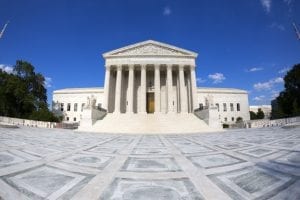
You have enough on your plate to worry about the cases currently being heard by the U.S. Supreme Court. That being said, there is one, in particular, you’re going to want to pay a little attention to – South Dakota v. Wayfair, Inc. This case is set to determine how states will determine nexus nationwide.
The cases outlined below challenge the physical presence nexus regulation initially established by the National Bellas Hess v. Department of Revenue (1967), which required a business to file and register for sales & use taxes only if they had a physical location, such as an office or building, or an employee physically located in a particular state.
The following explanations will provide you with a critical overview.
Listen to: The State Tax Response To Federal Tax Reform
- Quill Corp v. North Dakota: In 1992, the United States Supreme Court issued a ruling that stated physical presence within the taxing state is not required for nexus. Even though Quill Corp. had no physical presence in North Dakota and the only activity conducted in the state was via mail and common carrier (UPS, FedEx, etc.), the court ruled that Quill would be required to file for sales and use taxes in the state. This would come to be known as “economic presence” nexus, which would require out-of-state sellers with no physical presence in the taxing state (but with certain amounts of sales or transactions within that state) to file and register for sales and use taxes in a particular state.
- State of South Dakota v. Wayfair, Inc.: In 2017, a new case emerged to challenge the Quill Corp v. North Dakota decision (explained above). The U.S. Supreme Court granted cert (agreed to see case) in South Dakota v. Wayfair Inc., on Jan.12, 2018. Oral arguments are set to take place in April 2018. At that time, the justices and attorneys will present their arguments. Once heard, the court will issue a preliminary outcome of the case and/or draft an opinion. If these differ, another court conference will be needed to vote to change the outcome. A decision is expected in June, but it could be longer before we have a decision.
Why is the Wayfair Case important?
The outcome of this case will determine how states treat out-of-state sellers that have no physical presence in that state, but do a certain amount of sales and/or transactions in that same state, from a tax perspective. If upheld, the U.S. Supreme Court will rule that a business must have a “physical presence” in the taxing state in order for that state to require the business to register for sales and use taxes. If overturned, the U.S. Supreme Court will rule that “physical presence” is not necessary for a state to require a business to register and file for sales and use taxes.
Even if the case is upheld, we expect state legislators will try and challenge the fact there are more ways physical presence can be established, beyond just having a physical location and/or employees in the state in question. In this scenario, states will start finding “creative” ways to determine nexus, such as what is referred to as “platform” or “cookie” nexus. This means, for example, that even though an out-of-state seller only has a customer in a particular state but no other physical presence, nexus could still be establish if the customer were to download an app or software on their mobile device. The app or software, states would argue, be enough to consider the company as having a physical presence.
What does this mean for our clients?
Several of our clients either perform services or conduct/secure sales outside Ohio. We also know that there are countless customers in other states currently accessing our Ohio-based client’s app or software on their personal device. So, as you can imagine, we’re invested in the decision of the court.
Example 1: Quill Corp. v. North Dakota is overturned
In this scenario, our client, who only has an Ohio location, sells in excess of $500K to clients residing in the state of Washington, our client would be required to register and file for sales and use tax in Washington.
Example 2: Quill Corp. v. North Dakota is upheld
With states being more aggressive and hungrier, state legislators might decide that clients who give out-of-state customers access to their app or software are subject to sales and use tax because the app or software is enough to establish physical presence, or nexus, in the state.
Based on what we’ve noticed already, states are already started to implement “economic presence” nexus regulations, which means many states are already assuming the Wayfair case will be overturned.
We intend to stay current on the outcome of these regulations. Additionally, we plan to monitor our client’s activities in other states to ensure their compliance going forward in an attempt to avoid future fines and penalties.
Feel free to email Rea & Associates to learn more about these court cases and whether or not you will have to comply with more state and local tax laws moving forward.
By Joseph Popp, JD, LLM (Dublin Office)
